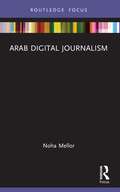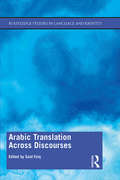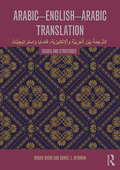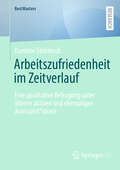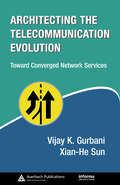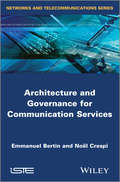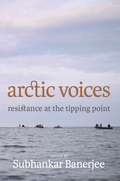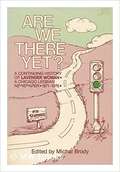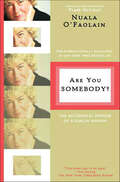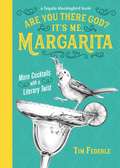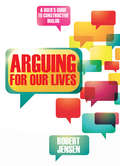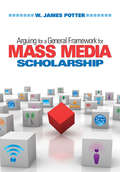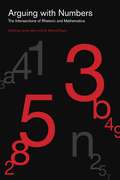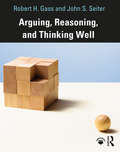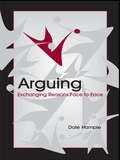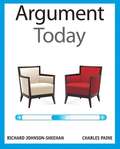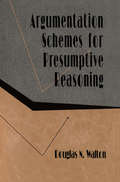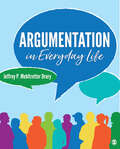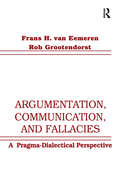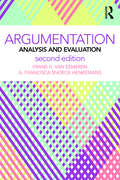- Table View
- List View
Arab Digital Journalism (Disruptions)
by Noha MellorResponding to urgent calls to de-westernise Media and Journalism Studies and shed light on local agency, this book examines digital journalistic practices in the Arab region, exploring how Arab journalists understand their roles and how digital technologies in Arab newsrooms are used to influence public opinion. Drawing on tens of articles penned by Arab media professionals and scholars, supplemented with informal conversations with journalists, this book reviews the historical development of digital journalism in the region and individual journalists’ perceptions of this development. While technology has provided a new platform for citizens and powerful agents to exchange views, this text examines how it has simultaneously allowed Arab states and authorities to conduct surveillance on journalists, curtail the rise of citizen journalism, and maintain offline hierarchal forms of political, economic, and cultural powers. Mellor also explores how digital technology serves to cement Western hegemony of the information world order, with Arab media organisations and audiences judged to be mere recipients, rather than producers, of such information. Arab Digital Journalism offers an important contribution to the emerging field of digital journalism in the Global South and is a valuable resource for students and researchers interested in media, journalism, communication, and development studies.
Arabic Translation Across Discourses (Routledge Studies in Language and Identity)
by Said FaiqA rare contribution to global translation as a ‘cross-cultural-open-concept’, Arabic Translation Across Discourses provides explorations of Arabic translation as an instance of transcultural and translingual encounters (transculguaging). This book examines the application and interrogation of discourses of translation in the translation of discourses (religion, literature, media, politics, technology, community, audiovisual, and automated systems of communication for translation). The contributors provide insights into the concerns and debates of Arabic translation as a tradition with local, yet global dimensions of translation and intercultural studies. This volume will be of great interest to students and researchers of all translation studies, but will also provide a rich source for those studying and researching history, geopolitics, intercultural studies, globalization, and allied disciplines.
Arabic-English Thematic Lexicon
by Daniel L. NewmanThe Arabic-English Thematic Lexicon is an invaluable resource for all learners of Arabic. It contains some 8,000 entries, arranged into themes, including flora and fauna, food and drink, the human body, health care, the family, housing, clothing, education, IT, sports, politics, economics and commerce, the law, media, language, geography, travel, religion, arts, science, and natural resources. Three appendices cover the names of Arab and selected non-Arab regions, countries and capitals, and international organizations. The entries in the Lexicon have been drawn from an extensive corpus of contemporary Standard Arabic vocabulary, based on authentic sources. In addition to verbs, nouns and adjectives, the Lexicon includes phrases and commonly used collocations, providing users with the necessary vocabulary in order to communicate effectively and confidently in both written and spoken standard Arabic. The Lexicon provides an indispensable complement to Arabic grammar instruction and also serves as a useful reference guide for all Arabic language users.
Arabic-English-Arabic-English Translation: Issues and Strategies
by Ronak Husni Daniel L. NewmanArabic-English-Arabic-English Translation: Issues and Strategies is an accessible coursebook for students and practitioners of Arabic-English-Arabic translation. Focusing on the key issues and topics affecting the field, it offers informed guidance on the most effective methods to deal with such problems, enabling users to develop deeper insights and enhance their translation skills. Key features include: A focus on Arabic-English translation in both directions, preparing students for the real-life experiences of practitioners in the field In-depth discussion of the core issues of phraseology, language variation and translation, legal translation and translation technology in Arabic and English translation Authentic sample texts in each chapter, taken from a variety of sources from across the Arabic-speaking world to provide snapshots of real-life language use Source texts followed by examples of possible translation strategies, with extensive commentaries, to showcase the best translation practices and methodologies A range of supporting exercises to enable students to practise their newly acquired knowledge and skills Inclusion of a wide range of themes covering both linguistic and genre issues, offering multidimensional perspectives and depth and breadth in learning List of recommended readings and resources for each of the topics under discussion Comprehensive glossary and bibliography at the back of the book. Lucid and practical in its approach, Arabic-English-Arabic-English Translation: Issues and Strategies will be an indispensable resource for intermediate to advanced students of Arabic. It will also be of great interest to professional translators working in Arabic-English-Arabic translation.
Arbeitszufriedenheit im Zeitverlauf: Eine qualitative Befragung unter älteren aktiven und ehemaligen Journalist*innen (BestMasters)
by Karoline SteinbockIn einer sich wandelnden Medienwelt sind Fragen nach der Zufriedenheit mit der Arbeit und nach Veränderungen der Zufriedenheit im Laufe des Berufslebens von zentraler Bedeutung. Die Forschungsarbeit geht der Frage nach, wie sich die beruflichen Erwartungen, die Veränderungen in der Medienlandschaft und die individuellen Karriereentscheidungen auf die Zufriedenheit ausgewirkt haben. Durch problemzentrierte Interviews mit ehemaligen, aktiven und bereits pensionierten Journalist*innen bietet die Arbeit wertvolle Einblicke, wie sich die Arbeitszufriedenheit unter dem Einfluss von Faktoren wie der digitalen Transformation und der Medienkrise entwickelt. Darüber hinaus wird untersucht, welche weiteren Faktoren die Arbeitszufriedenheit beeinflusst haben. Diese Untersuchung liefert nicht nur praxisrelevante Erkenntnisse für das Personalmanagement und die Organisationsentwicklung in der Medienbranche, sondern bietet auch eine tiefgehende Reflexion über die Arbeitswelt von Journalist*innen in einem sich ständig wandelnden Umfeld.
Architecting the Telecommunication Evolution: Toward Converged Network Services (Informa Telecoms & Media)
by Xian-He Sun Vijay K. GurbaniService-oriented architecture (SOA) uses services as the baseline for developing new architectures and applications, as networks are built specifically to satisfy service requirements. Most services are currently handled over different networks, but newer services will soon require cross-network support. Architecting the Telecommunication Evolution
Architectural Wireless Networks Solutions and Security Issues (Lecture Notes in Networks and Systems #196)
by Aboul Ella Hassanien Nilanjan Dey Santosh Kumar Das Sourav Samanta Bharat S. PatelThis book presents architectural solutions of wireless network and its variations. It basically deals with modeling, analysis, design and enhancement of different architectural parts of wireless network. The main aim of this book is to enhance the applications of wireless network by reducing and controlling its architectural issues. The book discusses efficiency and robustness of wireless network as a platform for communication and data transmission and also discusses some challenges and security issues such as limited hardware resources, unreliable communication, dynamic topology of some wireless networks, vulnerability and unsecure environment. This book is edited for users, academicians and researchers of wireless network. Broadly, topics include modeling of security enhancements, optimization model for network lifetime, modeling of aggregation systems and analyzing of troubleshooting techniques.
Architecture and Design for the Future Internet: 4WARD Project (Signals and Communication Technology)
by Luis M. Correia Klaus Wünstel Henrik Abramowicz Martin JohnssonArchitecture and Design for the Future Internet addresses the Networks of the Future and the Future Internet, focusing on networks aspects, offering both technical and non-technical perspectives. It presents the main findings of 4WARD (Architecture and Design for the Future Internet), a European Integrated Project within Framework Programme 7, which addressed this area from an innovative approach. Today's network architectures are stifling innovation, restricting it mostly to the application level, while the need for structural change is increasingly evident. The absence of adequate facilities to design, optimise and interoperate new networks currently forces a convergence to an architecture that is suboptimal for many applications and that cannot support innovations within itself, the Internet. 4WARD overcomes this impasse through a set of radical architectural approaches, built on a strong mobile and wireless background. The main topics addressed by the book are: the improved ability to design inter-operable and complementary families of network architectures; the enabled co-existence of multiple networks on common platforms through carrier-grade virtualisation for networking resources; the enhanced utility of networks by making them self-managing; the increased robustness and efficiency of networks by leveraging diversity; and the improved application support by a new information-centric paradigm in place of the old host-centric approach. These solutions embrace the full range of technologies, from fibre backbones to wireless and sensor networks.
Architecture and Governance for Communication Services
by Emmanuel Bertin Noël CrespiCommunication services are evolving at an unprecedented rate. No longer limited to interpersonal vocal communication, they now integrate functions such as address books, content sharing and messaging. The emergence of social networks – which may also include these features – is an important element of this transformation. Content services are becoming flagship services themselves, and are sometimes paired up with conversation services. The boundaries between different services are becoming less and less distinct. This book meets the need for a better understanding of communication services, and for a general framework of their description. A detailed overview on service architecture in the Telco, Web and IT worlds is presented, offering a roadmap with explanations on how to improve the architecture and governance of communication service architectures by exploiting the syntax and semantics that are common to different services is clearly outlined. This book also responds to recurring questions about service design, such as the functional scope of enablers or SOA (Service Oriented Architecture) services, the relevance of service composition to the user and collaboration between different services in a converged environment. Many concrete examples from telecoms service providers’ operations illustrate these concepts. Contents 1. Describing Service Architectures. 2. Convergence of Service. 3. Building an Architectural Framework for Telecom Services. 4. Modeling and Case Study. 5. Organizational and Software Applications. About the Authors Emmanuel Bertin is senior service architect at Orange Labs in France. He is the author of more than 40 research papers, and holds more than 10 patents in the area of communication services. Noël Crespi worked at Bouygues Telecom, France Telecom R&D, and then at Nortel Networks where he led the Telephony Programme. He is currently Professor and Head of the Service Architecture Laboratory at Institut Mines-Telecom, Telecom SudParis in France and is the author/co-author of more than 160 research papers and 140 contributions in standardization.
Arctic Voices: Resistance at the Tipping Point
by Subhankar BanerjeeA pristine environment of ecological richness and biodiversity. Home to generations of indigenous people for thousands of years. The location of vast quantities of oil, natural gas and coal. Largely uninhabited and long at the margins of global affairs, in the last decade Arctic Alaska has quickly become the most contested land in recent US history. World-renowned photographer, writer, and activist Subhankar Banerjee brings together first-person narratives from more than thirty prominent activists, writers, and researchers who address issues of climate change, resource war, and human rights with stunning urgency and groundbreaking research. From Gwich'in activist Sarah James's impassioned appeal, "We Are the Ones Who Have Everything to Lose," during the UN Climate Conference in Copenhagen in 2009 to an original piece by acclaimed historian Dan O'Neill about his recent trips to the Yukon Flats fish camps, Arctic Voices is a window into a remarkable region.Other contributors include Seth Kantner, Velma Wallis, Nick Jans, Debbie Miller, Andri Snaer Magnason, George Schaller, George Archibald, Cindy Shogan, and Peter Matthiessen.
Are We There Yet?: A Continuing History Of Lavender Woman: A Chicago Lesbian Newpaper 1971-1976
by Michal BrodySerious yet entertaining history of an exciting lesbian era. Thought-provoking analysis and lively description.
Are You Somebody?: The Accidental Memoir of a Dublin Woman
by Nuala O'Faolain"You don't want the book to end; it glows with compassion and you want more, more because you know this is a fine wine of a life, richer as it ages."—Frank McCourt, author of Angela's AshesOne of nine children born into a penniless North Dublin family, Nuala O'Faolain was saved from a harrowing childhood by her love of books and reading. Though she ultimately became one of Ireland's best-known columnists, her professional success did little to ease her loneliness and longing for a deep connection to the world. Are You Somebody? distills her experiences into a wisdom that can only come from an obstinate refusal to shrink from life.This commemorative edition of her landmark memoir celebrates O'Faolain's remarkable life and work with a new foreword from Frank McCourt as well as additional archival materials. Strikingly vivid and starkly emotional, Are You Somebody? is, like O'Faolain herself, a singular example of courage, honesty, and bold living.
Are You There God? It's Me, Margarita: More Cocktails with a Literary Twist (A Tequila Mockingbird Book)
by Tim Federle Lauren Mortimer<p>Literature, puns, and alcohol collide in this clever follow-up to Tequila Mockingbird, the world's bestselling cocktail recipes book. <p>Tim Federle's Tequila Mockingbird has become one of the world's bestselling cocktail books and resonated with bartenders and book clubs everywhere. Now in this much anticipated follow-up, Are You There God? It's Me, Margarita, Federle has shaken up 49 all-new, all-delicious drink recipes paired with his trademark puns and clever commentary on more of history's most beloved books, as well as bar bites, drinking games, and whimsical illustrations throughout. <p>Cocktails include: Fifty Shades of Grey Goose, The Handmaid's Ale, Little Soused on the Prairie, Tender Is the Nightcap, A Room With Vermouth, Go Get a Scotch, Man; As I Lay Drinking, and much more!
Arguing for Our Lives
by Robert JensenWe live in a time when public discourse is more skewed than ever by the propaganda that big money can buy, with trust in the leadership of elected officials at an all-time low. The "news" has degenerated into sensationalist sound bites, and the idea of debate has become a polarized shouting match that precludes any meaningful discussion.It's also a time of anxiety, as we're faced with economic and ecological crises on a global scale, with stakes that seem higher than ever before. In times like these, it's essential that we be able to think and communicate clearly.In this lively primer on critical thinking, Robert Jensen attacks the problems head on and delivers an accessible and engaging book that explains how we can work collectively to enrich our intellectual lives. Drawing on more than two decades of classroom experience and community organizing, Jensen shares strategies on how to challenge "conventional wisdom" in order to courageously confront the crises of our times and offers a framework for channeling our fears and frustrations into productive analysis that can inform constructive action.Jensen connects abstract ideas with the everyday political and spiritual struggles of ordinary people. Free of either academic or political jargon, this book is for anyone struggling to understand our world and contribute to making it a better place.Robert Jensen is a professor in the School of Journalism at the University of Texas at Austin and a founding board member of the Third Coast Activist Resource Center.
Arguing for a General Framework for Mass Media Scholarship
by Dr W. James Potter"Arguing for a General Framework for Mass Media Scholarship challenges scholars and students to consider and reconsider what we know about media and how we think about media. As such, the book provides an important framework for thinking about knowledge—regardless of the discipline… The text provides all of the necessary tools to move the field forward in a way that will increase the rigor of the work being done and augment the overall profile of the discipline." –Dana Mastro, University of Arizona In this groundbreaking book, W. James Potter presents an innovative perspective to media scholars and students who are frustrated with the fragmentation of research findings across so many journals, books, and fields. Arguing for a General Framework for Mass Media Scholarship presents a clear plan for a more efficient way to build knowledge about the mass media so that it can be better organized and made more useful. Key Features Conducts an in-depth analysis of mass media scholarship's four major facets of effects, content, audiences, and organizations Presents a significant shift in conceptualizing media effects and ways research can be conducted to generate more useful knowledge about media influence Develops "narrative line" as a tool to guide analyses about how content decisions are made by producersSynthesizes a system of explanation about why audiences attend to certain messages and how individuals construct meaning from those messagesIncorporates an analysis of mass media organizations to provide greater context of understanding messages and their effects on individuals and macro units in society"The book will play an important role in providing structure to a broad, fragmented discipline. I believe it will, at the very least, create important dialogues about what we now know/understand about areas of mass media, and where we should move as a discipline… This book is clearly a 'call to arms' for mass media scholars to ratchet up the quality of research (and what we know), to see the interconnections within and among strands of scholarship, and to move forward in a more efficient, organized manner. Professor Potter should be commended for this." —Roger Cooper, Ohio University "This book is...that call to action that comes forward every few years, to wake us up and challenge our ways of doing things, not by being radical, but via synthesis... I've been waiting for several years for a book like this." —Sahara Byrne, Cornell University
Arguing with Numbers: The Intersections of Rhetoric and Mathematics (RSA Series in Transdisciplinary Rhetoric #16)
by James Wynn G. Mitchell ReyesAs discrete fields of inquiry, rhetoric and mathematics have long been considered antithetical to each other. That is, if mathematics explains or describes the phenomena it studies with certainty, persuasion is not needed. This volume calls into question the view that mathematics is free of rhetoric. Through nine studies of the intersections between these two disciplines, Arguing with Numbers shows that mathematics is in fact deeply rhetorical. Using rhetoric as a lens to analyze mathematically based arguments in public policy, political and economic theory, and even literature, the essays in this volume reveal how mathematics influences the values and beliefs with which we assess the world and make decisions and how our worldviews influence the kinds of mathematical instruments we construct and accept. In addition, contributors examine how concepts of rhetoric—such as analogy and visuality—have been employed in mathematical and scientific reasoning, including in the theorems of mathematical physicists and the geometrical diagramming of natural scientists. Challenging academic orthodoxy, these scholars reject a math-equals-truth reduction in favor of a more constructivist theory of mathematics as dynamic, evolving, and powerfully persuasive. By bringing these disparate lines of inquiry into conversation with one another, Arguing with Numbers provides inspiration to students, established scholars, and anyone inside or outside rhetorical studies who might be interested in exploring the intersections between the two disciplines.In addition to the editors, the contributors to this volume are Catherine Chaput, Crystal Broch Colombini, Nathan Crick, Michael Dreher, Jeanne Fahnestock, Andrew C. Jones, Joseph Little, and Edward Schiappa.
Arguing with Numbers: The Intersections of Rhetoric and Mathematics (RSA Series in Transdisciplinary Rhetoric)
by James Wynn G. Mitchell ReyesAs discrete fields of inquiry, rhetoric and mathematics have long been considered antithetical to each other. That is, if mathematics explains or describes the phenomena it studies with certainty, persuasion is not needed. This volume calls into question the view that mathematics is free of rhetoric. Through nine studies of the intersections between these two disciplines, Arguing with Numbers shows that mathematics is in fact deeply rhetorical. Using rhetoric as a lens to analyze mathematically based arguments in public policy, political and economic theory, and even literature, the essays in this volume reveal how mathematics influences the values and beliefs with which we assess the world and make decisions and how our worldviews influence the kinds of mathematical instruments we construct and accept. In addition, contributors examine how concepts of rhetoric—such as analogy and visuality—have been employed in mathematical and scientific reasoning, including in the theorems of mathematical physicists and the geometrical diagramming of natural scientists. Challenging academic orthodoxy, these scholars reject a math-equals-truth reduction in favor of a more constructivist theory of mathematics as dynamic, evolving, and powerfully persuasive. By bringing these disparate lines of inquiry into conversation with one another, Arguing with Numbers provides inspiration to students, established scholars, and anyone inside or outside rhetorical studies who might be interested in exploring the intersections between the two disciplines.In addition to the editors, the contributors to this volume are Catherine Chaput, Crystal Broch Colombini, Nathan Crick, Michael Dreher, Jeanne Fahnestock, Andrew C. Jones, Joseph Little, and Edward Schiappa.
Arguing, Reasoning, and Thinking Well
by Robert Gass John SeiterArguing, Reasoning, and Thinking Well offers an engaging and accessible introduction to argumentation and critical thinking. With a pro-social focus, the volume encourages readers to value civility when engaged in arguing and reasoning. Authors Gass and Seiter, renowned for their friendly writing style, include real-world examples, hypothetical dialogues, and editorial cartoons to invite readers in. The text includes a full chapter devoted to the ethics of argument, as well as content on refutation and formal logic. It is designed for students in argumentation and critical thinking courses in communication, philosophy, and psychology departments, and is suitable for students and general education courses across the curriculum.
Arguing: Exchanging Reasons Face to Face (Routledge Communication Series)
by Dale HampleArguing: Exchanging Reasons Face to Face describes the process and products of face-to-face argument. Author Dale Hample presents arguing as a type of interpersonal interaction, rather than as a kind of text or a feature of a public speech. He focuses primarily on argument production, and explores the rhetorical and philosophical traditions of arguing, keeping as the volume's main focus the integration of arguing into the literatures on message production, conflict management, and interpersonal communication.Distinctive in its approach, this volume offers:*a synthesis of empirical research on situational and individual differences in arguing;*an exploration of argument frames--perceptions and expectations about arguing;*an examination of the conversational and rational natures of argument products;*a psychological description of inventional processes; and*a full chapter on the emotional experience of arguing.This unique work is appropriate for scholars and graduate students in argumentation, discourse, persuasion, conflict management, interpersonal communication, organizational communication, and message production.
Argument Today
by Richard Johnson-Sheehan Charles PainePersuasion (Rhetoric) -- Problems, exercises, etc. textbook for college students
Argumentation Schemes for Presumptive Reasoning
by Douglas WaltonRecent concerns with the evaluation of argumentation in informal logic and speech communication center around nondemonstrative arguments that lead to tentative or defeasible conclusions based on a balance of considerations. Such arguments do not appear to have structures of the kind traditionally identified with deductive and inductive reasoning, but are extremely common and are often called "plausible" or "presumptive," meaning that they are only provisionally acceptable even when they are correct. How is one to judge, by some clearly defined standard, whether such arguments are correct or not in a given instance? The answer lies in what are called argumentation schemes -- forms of argument (structures of inference) that enable one to identify and evaluate common types of argumentation in everyday discourse. This book identifies 25 argumentation schemes for presumptive reasoning and matches a set of critical questions to each. These two elements -- the scheme and the questions -- are then used to evaluate a given argument in a particular case in relation to a context of dialogue in which the argument occurred. In recent writings on argumentation, there is a good deal of stress placed on how important argumentation schemes are in any attempt to evaluate common arguments in everyday reasoning as correct or fallacious, acceptable or questionable. However, the problem is that the literature thus far has not produced a precise and user-friendly enough analysis of the structures of the argumentation schemes themselves, nor have any of the documented accounts been as helpful, accessible, or systematic as they could be, especially in relation to presumptive reasoning. This book solves the problem by presenting the most common presumptive schemes in an orderly and clear way that makes them explicit and useful as precisely defined structures. As such, it will be an indispensable tool for researchers, students, and teachers in the areas of critical thinking, argumentation, speech communication, informal logic, and discourse analysis.
Argumentation in Everyday Life
by Jeffrey P. Drury"Good coverage of concepts with understandable explanations of theory. Very user friendly with exercises to use in and out of class. Connects well with other communication classes through the application of other communication concepts to argumentation." —Christopher Leland, Azusa Pacific University Argumentation in Everyday Life provides students with the tools they need to argue effectively in the classroom and beyond. Jeffrey P. Mehltretter Drury offers rich coverage of theory while balancing everyday applicability, allowing students to use their skills soundly. Drury introduces the fundamentals of constructing and refuting arguments using the Toulmin model and ARG conditions (Acceptability, Relevance, and Grounds). Numerous real-world examples are connected to the theories of rhetoric and argumentation discussed—enabling students to practice and apply the content in personal, civic, and professional contexts, as well as traditional academic debates. Encouraging self-reflection, this book empowers students to find their voice and create positive change through argumentation in everyday life. Unique resources to help students navigate this complex terrain of argumentation: "The Debate Situation" offers students a birds-eye view of any given debate (or exchange of arguments between two or more people) organized around three necessary components: arguments, issues, and the proposition. The visual model of the debate situation illustrates how these features work together in guiding a debate and it lays the groundwork for understanding and generating arguments. Easy to Use Standards for Evaluating Arguments combine a prominent argument model (named after logician Stephen Toulmin) with a standards-based approach (the ARG conditions) to test of quality of an argument. The ARG conditions are three questions an advocate should ask of an argument in determining whether or not it is rationally persuasive. These questions are best served by research but don’t necessary require it, and thus they provide a useful posture for critically assessing the arguments you encounter. Multiple "Everyday Life" examples with an emphasis on context help students to connect the lessons more fully to their everyday life and encourages them to grapple explicitly with dilemmas arising in different contexts. "Find Your Voice Prompts" focus on choice & empowerment to offer strategies for students to choose which arguments to address and how to address them—empowering students to use argumentation to find their voice. "Build Your Skill Prompts" use objective applications to test how well students have learned the information. They offer a chance to apply the material to additional examples that students can check against the answers in Appendix II. Two application exercises at the end of each chapter encourage students to think critically about the content, discuss their thoughts with their peers, and apply the material to everyday situations.
Argumentation in Everyday Life
by Jeffrey P. Drury"Good coverage of concepts with understandable explanations of theory. Very user friendly with exercises to use in and out of class. Connects well with other communication classes through the application of other communication concepts to argumentation." —Christopher Leland, Azusa Pacific University Argumentation in Everyday Life provides students with the tools they need to argue effectively in the classroom and beyond. Jeffrey P. Mehltretter Drury offers rich coverage of theory while balancing everyday applicability, allowing students to use their skills soundly. Drury introduces the fundamentals of constructing and refuting arguments using the Toulmin model and ARG conditions (Acceptability, Relevance, and Grounds). Numerous real-world examples are connected to the theories of rhetoric and argumentation discussed—enabling students to practice and apply the content in personal, civic, and professional contexts, as well as traditional academic debates. Encouraging self-reflection, this book empowers students to find their voice and create positive change through argumentation in everyday life. Unique resources to help students navigate this complex terrain of argumentation: "The Debate Situation" offers students a birds-eye view of any given debate (or exchange of arguments between two or more people) organized around three necessary components: arguments, issues, and the proposition. The visual model of the debate situation illustrates how these features work together in guiding a debate and it lays the groundwork for understanding and generating arguments. Easy to Use Standards for Evaluating Arguments combine a prominent argument model (named after logician Stephen Toulmin) with a standards-based approach (the ARG conditions) to test of quality of an argument. The ARG conditions are three questions an advocate should ask of an argument in determining whether or not it is rationally persuasive. These questions are best served by research but don’t necessary require it, and thus they provide a useful posture for critically assessing the arguments you encounter. Multiple "Everyday Life" examples with an emphasis on context help students to connect the lessons more fully to their everyday life and encourages them to grapple explicitly with dilemmas arising in different contexts. "Find Your Voice Prompts" focus on choice & empowerment to offer strategies for students to choose which arguments to address and how to address them—empowering students to use argumentation to find their voice. "Build Your Skill Prompts" use objective applications to test how well students have learned the information. They offer a chance to apply the material to additional examples that students can check against the answers in Appendix II. Two application exercises at the end of each chapter encourage students to think critically about the content, discuss their thoughts with their peers, and apply the material to everyday situations.
Argumentation, Communication, and Fallacies: A Pragma-dialectical Perspective
by Rob Grootendorst Frans H. van EemerenThis volume gives a theoretical account of the problem of analyzing and evaluating argumentative discourse. After placing argumentation in a communicative perspective, and then discussing the fallacies that occur when certain rules of communication are violated, the authors offer an alternative to both the linguistically-inspired descriptive and logically-inspired normative approaches to argumentation. The authors characterize argumentation as a complex speech act in a critical discussion aimed at resolving a difference of opinion. The various stages of a critical discussion are outlined, and the communicative and interactional aspects of the speech acts performed in resolving a simple or complex dispute are discussed. After dealing with crucial aspects of analysis and linking the evaluation of argumentative discourse to the analysis, the authors identify the fallacies that can occur at various stages of discussion. Their general aim is to elucidate their own pragma- dialectical perspective on the analysis and evaluation of argumentative discourse, bringing together pragmatic insight concerning speech acts and dialectical insight concerning critical discussion.
Argumentation: Analysis and Evaluation (Routledge Communication Series #8)
by Frans H. van Eemeren A. Francisca HenkemansThis book concentrates on argumentation as it emerges in ordinary discourse, whether the discourse is institutionalized or strictly informal. Crucial concepts from the theory of argumentation are systematically discussed and explained with the help of examples from real-life discourse and texts. The basic principles are explained that are instrumental in the analysis and evaluation of argumentative discourse. Methodical instruments are offered for identifying differences of opinion, analyzing and evaluating argumentation and presenting arguments in oral and written discourse. Attention is also paid to the way in which arguers attempt to be not just reasonable, but effective as well, by maneuvering strategically. In addition, the book provides a great variety of exercises and assignments to improve the student’s skill in presenting argumentation. The authors begin their treatment of argumentation theory at the same juncture where argumentation also starts in practice: The difference of opinion that occasions the evolvement of the argumentation. Each chapter begins with a short summary of the essentials and ends with a number of exercises that students can use to master the material. Argumentation is the first introductory textbook of this kind. It is intended as a general introduction for students who are interested in a proper conduct of argumentative discourse. Suggestions for further reading are made for each topic and several extra assignments are added to the exercises. Special features: • A concise and complete treatment of both the theoretical backgrounds and the practice of argumentation analysis and evaluation. • Crucial concepts from pragmatics (speech act theory, Grice’s cooperative principle) presented in a non-technical way; introducing the theory of verbal communication. • The first textbook treatment of strategic maneuvering as a way of balancing being reasonable with being effective • Exercises and assignments based on real-life texts from a variety of contexts.
